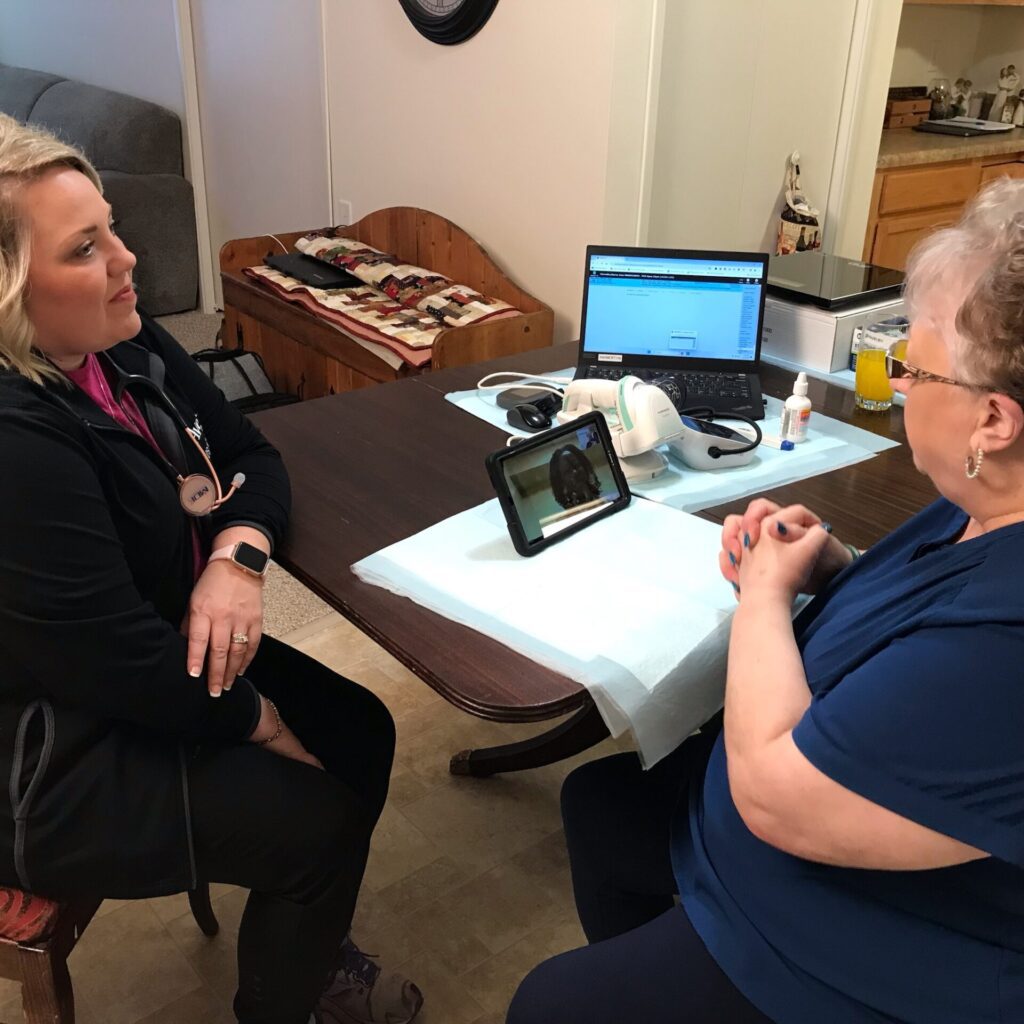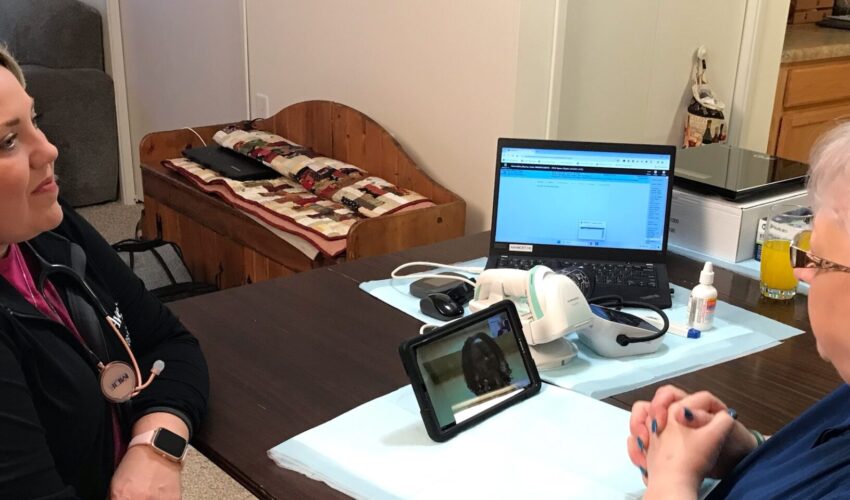How your next hospital stay could be at home
Jan. 29, 2024
This paid piece is sponsored by Avera.
Being admitted to the hospital is no one’s dream come true, but if you’re sick or injured, it may become your reality. Yet what if you could get the hospital care you need – at home?
That’s happening for selected patients at Avera Hospital@Home, a collaboration between Avera McKennan Hospital & University Health Center and Avera@Home, Avera’s home care and hospice agency.
Avera McKennan began piloting the program two years ago and has cared for 200-plus patients, providing over 500 bed days. “It’s tried and tested, and showing positive results,” said Dr. Magdalene Fiddler, hospitalist physician and medical director for Hospital@Home.
Hospital@Home patient Marva Chevalier (right), visits with Dr. Magdalene Fiddler virtually on a tablet, along with Bethlee Burke, nurse practitioner (left).
“We have had very few hospital readmissions because our nurses work with patients in their own home environment where patients can move about more and are generally more comfortable. We’ve had outstanding outcomes and feedback from patients. Patients are beginning to ask for this type of care,” said Cynthia Kannenberg, nurse manager for Hospital@Home.
Preventing readmission is a key goal of insurers because it saves costs. But it also saves the patient: money, discomfort of future illness and the life interruption of being hospitalized.
In November 2020, the Centers for Medicare & Medicaid Services launched its Hospital Without Walls initiative to address concerns about hospital bed capacity because of COVID-19. Through a waiver-granting process, the initiative allows CMS-approved hospitals like Avera McKennan to provide inpatient-level care in the home environment for Medicare and Medicaid beneficiaries.
“I see this as the future of health care and a big win for patients because people prefer to be in the comfort of their homes rather than a hospital with alarms and extra noise,” said Dr. Ron Place, regional president and CEO of Avera McKennan. “Expanding hospital care to the home will become more efficient with scale and eventually help to reduce costs and improve quality, saving insurers and patients while keeping people where they prefer to be: with their loved ones.”
Now, people with all types of health insurance and even self-pay patients can be considered for Avera’s Hospital@Home. Cost to the patient is similar to a stay in the hospital.
People age 18 and older are eligible if they fall within certain diagnoses and meet criteria. In fact, patients are not selected for Hospital@Home unless doctors and caregivers are confident they can safely manage all aspects of care at home.
They must have a care plan that would work in the home. They need to live within a 30-mile radius of the hospital if they should have a change in status. They also need to be able to get around at home without risk of falling and follow instructions. While it’s not absolutely necessary to have a caregiver in the home, like a spouse or adult child, that’s helpful.
“We provide all the medications and equipment they need,” Kannenberg said. Patients get individualized care including:
- Two visits per day from nurses who perform lab draws, take vital signs, answer questions, monitor progress and provide care interventions as needed as part of the patient’s care plan. These hospital-trained nurses follow the same policies, procedures and best practices as they would in the hospital.
- Visits as needed from professionals such as respiratory therapists or physical therapists.
- Virtual rounds each day from a physician, either an Avera hospitalist or internal medicine specialist. Doctors check in with the patient on a tablet that’s privately connected via cellular towers rather than internet.
- 24/7 availability to both nurses and doctor via the tablet and in person if needed. “If they need someone, day or night, we’ll be there,” Kannenberg said.
- Access to hospital resources such as social workers, chaplains and case managers.
- Specialty consults via telemedicine if needed.
- Food delivered daily based on a physician-ordered diet, in individual containers that can be microwaved.
Length of stay ranges from one to four days on average.
Patients may be identified for the program through the emergency department or doctor’s clinic before admission. Or, they may begin care in the hospital and be offered the chance to finish their hospital stay at home.
There are aspects of Hospital@Home that provide better quality of life. One is uninterrupted sleep throughout the night in your own bed. Another is the independence of being home and wearing your own clothes.
Patients can eat their hospital meals at their leisure and on their own timetable, or they can choose to eat their own food at home. Wise choices are important, however.
“If you’re being treated for complications of diabetes, it’s not the best choice to eat pie and ice cream. We try to educate people about how the choices they make do impact their health,” Kannenberg said.
If patients need diagnostic tests such as a CT or MRI scan, the hospital provides transport to and from home. Staff can bring X-ray equipment to the home if there are fewer than six steps into the home.
Discharge is an easier transition because the patient is already home. There’s no waiting on paperwork once the doctor clears the patient for discharge. Patients may benefit from stepping down the level of care from hospital to at-home care through Avera@Home. Again, this is an easy transition.
“Easing hospital capacity is a benefit, but the main benefit is meeting people where they want to be – and that’s often at home,” Fiddler said.
“Patients have been extremely positive and grateful for the program,” Kannenberg said. “They get to know and love their care team. Interactions are comfortable and not rushed. Most patients do better at home – they look better and feel better. In fact, COVID patients often do better at home than in the hospital. So we’re excited about the possibilities of hospital care at home.”








